Introduction

Depression is something beyond feeling blue or having a terrible day. A serious psychological wellness condition influences a large number of individuals around the world. Understanding misery is significant for the individuals who experience it as well as for their loved ones. By revealing insight into this point, we can assist with breaking the disgrace and offer genuinely necessary help to those out of luck.
What is Depression?
Depression is a complex psychological wellness problem described by constant sensations of misery, sadness, and indifference toward exercises once delighted in. Dissimilar to incidental bitterness or distress, sadness can keep going for weeks, months, or even years, fundamentally impeding everyday work.
Types of Depression
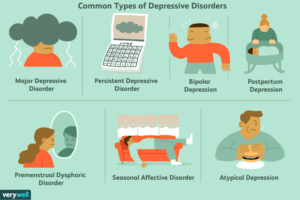
Depression appears in different structures, each with its remarkable qualities and difficulties.
Major Depressive Disorder (MDD)
Major Depressive Disorder Problem is portrayed by serious side effects that disrupt the capacity to work, rest, study, eat, and appreciate life. An episode of significant sorrow might happen just a single time in an individual’s lifetime, however on a more regular basis, it repeats all through an individual’s life.
Persistent Depressive Disorder (PDD)
Otherwise called dysthymia, Persistent Depressive Disorder Issue includes long-haul (ongoing) side effects that may not be as serious as those of significant sorrow however can in any case forestall ordinary working and feeling good. Individuals with PDD may likewise encounter episodes of significant sorrow.
Bipolar Disorder
Bipolar Disorder, is described by outrageous emotional episodes that incorporate profound highs (madness or hypomania) and lows (sorrow). These movements can influence rest, energy, action, judgment, conduct, and the capacity to think.
Seasonal Affective Disorder (SAD)
Occasional Emotional Problem is a sort of depression that travels every which way with the seasons, regularly beginning in the pre-winter and late-fall and disappearing throughout the spring and summer. This problem is believed to be connected with changes in light openness.
Postpartum Depression
Postpartum anxiety is a perplexing blend of physical, close-to-home, and social changes that occur in a lady in the wake of conceiving an offspring. A difficult condition can make it challenging for new moms to finish day-to-day care exercises for them as well as their children.
Causes of Depression
Depression is normally the consequence of a mix of hereditary, natural, ecological, and mental elements.
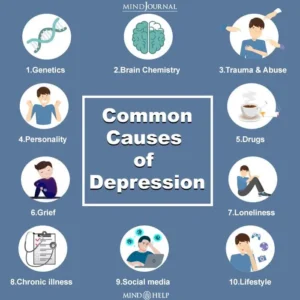
Biological Factors
Research indicates that depression is associated with imbalances in certain chemicals in the brain. Additionally, a family history of depression may increase the risk.
Psychological Factors
People with low self-esteem, who are easily overwhelmed by stress, or who are generally pessimistic are more likely to experience depression.
Environmental Factors
Continuous exposure to violence, neglect, abuse, or poverty may make some people more vulnerable to depression.
Symptoms of Depression
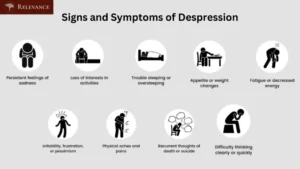
The side effects of depression can be far-reaching and different.
Emotional Symptoms
These incorporate relentless pity, sensations of sadness, peevishness, and loss of interest in exercises once appreciated.
Physical Symptoms
Depression can show true weakness, changes in hunger, rest aggravations, and unexplained throbbing painfulness.
Behavioral Symptoms
Conduct changes like withdrawal from social exercises, ignoring liabilities, and a general lessening in efficiency are additionally normal.
Diagnosis of Depression
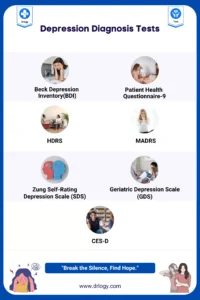
Diagnosing depression includes a careful clinical evaluation by a medical services supplier.
Clinical Assessment
A clinical evaluation commonly incorporates a nitty gritty meeting and may include surveys to decide the seriousness of depression.
Diagnostic Criteria
The Diagnostic and Statistical Manual of Mental Disorders (DSM-5) outlines specific criteria for diagnosing depression, which includes experiencing five or more symptoms for at least two weeks.
CLICK HERE FOR MORE INFORMATION
Treatment Options for Depression
There are different treatment choices accessible to successfully depression.

Medication
Antidepressants can assist with adjusting synthetic substances in the cerebrum. It might require a little while to see the full advantages.
Psychotherapy
Talk treatment, like mental social treatment (CBT) and relational treatment (IPT), can help people comprehend and change their thinking examples and ways of behaving.
Lifestyle Changes
Normal activity, a solid eating regimen, and sufficient rest can essentially affect decreasing depression side effects.
Alternative Therapies
Elective medicines like needle therapy, yoga, and homegrown enhancements can likewise be gainful for certain individuals.
Preventing Depression
While not all cases of depression can be prevented, certain strategies can reduce the risk.
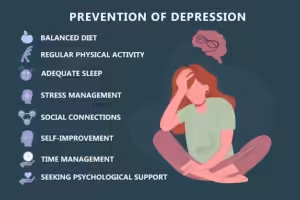
Recognizing Early Signs
Monitoring the early indications of depression can assist people in looking for help before the condition declines.
Developing Healthy Habits
Keeping a decent way of life with ordinary active work, smart dieting, and sufficient rest can add to generally speaking emotional well-being.
Seeking Help Proactively
If you notice signs of depression, seeking help from a mental health professional early can prevent the condition from becoming more severe.
Conclusion
Depression is an intricate and testing condition, however, it is sensible with the right mix of medicines and backing. Assuming that you or somebody you know is battling with depression, make it a point to help. Grasping, persistence, and expert direction can have a significant effect on the excursion towards recuperation.
FAQs
1. Can depression be cured completely?
While depression can be overseen successfully, it may not be “relieved” in the customary sense. Many individuals live full, useful lives with legitimate treatment.
2. How do I know if I have depression or just feeling sad?
Assuming that you have diligent misery alongside different side effects like changes in rest, craving, and interest in exercises for over fourteen days, it very well might be depression.
3. What should I do if someone I know shows signs of depression?
Urge them to look for proficient assistance, offer help and understanding, and tune in without judgment.